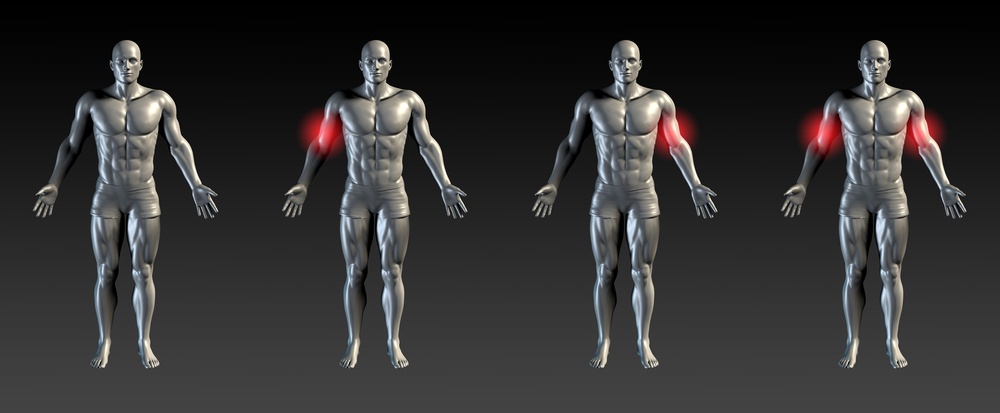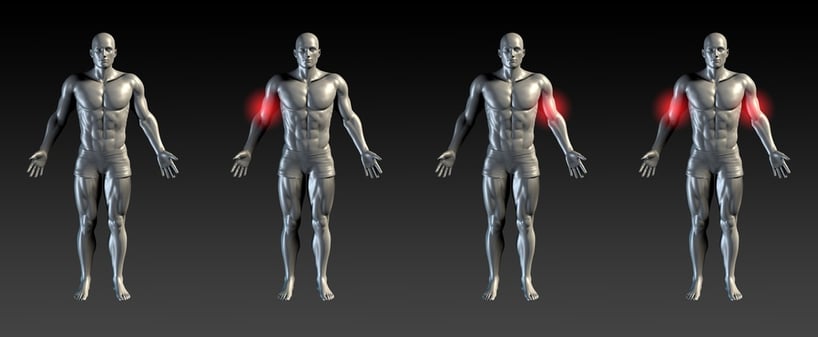Torn Biceps Tendon: Symptoms, Causes, Risk Factors
October 9th, 2017 | 4 min. read


The upper arm has two muscle groups: the biceps (the muscle running along the front of the upper arm) and the triceps (the muscle along the back of the upper arm). The biceps muscles are the ones you feel when you flex. (Think Popeye or a weight lifter.) Biceps attach at the shoulder and at the elbow and run down the length of the inner arm.
The function of the biceps muscle is to flex the arm, bending at the elbow. This movement is a lifting motion, allowing you to bring things up from waist height to shoulder height, such as when you’re carrying grocery handle bags. The biceps also allows you to rotate the forearm downward (for example, when typing at a computer or hitting a volleyball or tennis serve).
Biceps tears can refer to tears of the muscle itself, but this term is most frequently used to describe tears and ruptures of the tendons that attach the biceps muscle to bone. Biceps tendons are found at the elbow and at the shoulder, and either of these can become subject to injury, much like any other tendon.
Biceps tendon tears and ruptures can be partial or complete, and depending where they’re located are either the result of sudden trauma (such as a sports injury) or age-related wear and tear.
Some people can get along with a weakened or compromised arm after this type of soft tissue injury, but often people will opt for surgery to repair the damaged tendon.
Biceps Tendon Tears: Causes and Risk Factors
How do people tear their biceps tendons? The causes vary.
Elbow Biceps Tendon Tears
These are far rarer than shoulder biceps tendon tears, affecting an estimated 5 out of 100,000 people each year. The cause of this biceps tear is nearly always a sudden traumatic injury to the arm, unrelated to any other ongoing problems or health conditions.
Causes of elbow biceps tendon tear
If your arm is forced straight under the pressure of a heavy weight or a substantial force, the biceps tendon can pull away from the bone at the elbow, creating a tear that can sometimes separate the muscle entirely from its anchor point. Situations where this might occur include:
- Trying and failing to lift a very heavy set of dumbbells at the gym
- Misjudging the weight of a heavy item you’re trying to lift or move
- Catching or lifting another person (e.g., in pair skating, competitive cheerleading, or dance)
This particular injury seldom occurs, but when it does, arm function and strength suffer. Most patients are left with a weaker arm that can’t rotate completely. Surgical tendon repair is needed in order to regain former strength and the ability to fully rotate the forearm.
Risk Factors for elbow biceps tendon tear
Though this type of injury can happen to anyone, a few risk factors may make you more likely to suffer this particular biceps tendon tear:
- Males over age 30. Women and younger men are rarely affected by this injury.
- Corticosteroids injections. Too many of these injections can weaken tendons, making them more likely to rupture.
- Studies indicate that smoking inhibits healing and prevents sufficient oxygen from getting to bones and tissue. Use of nicotine is associated with an increase in musculoskeletal injuries in general, and overuse injuries in particular, including tendonitis.
Symptoms of elbow Biceps tear
Symptoms of an elbow biceps tear include:
- Sudden and severe at the time of injury, but it may decrease over a period of several days or weeks.
- Popping sound. Not everyone experiences this, but you may hear a pop or snap at the time of injury.
- Swelling and tenderness in front of the elbow joint.
- Bruising in the elbow and forearm areas.
- Weakness when bending the elbow or twisting the forearm.
- Visible changes to the arm. You may notice a bulge in the upper part of your arm. This is caused by the tendon snapping, releasing tension that normally pulls the biceps muscle tight across the upper arm between the shoulder and the elbow. When the elbow end snaps, the muscle may “bunch up” nearer to the shoulder. You may also see and feel a gap or dent in front of the elbow where the tendon used to be.
Shoulder Biceps Tendon Tears
Shoulder biceps tendon tears are much more common than elbow tears, largely because shoulders are more susceptible to injury in general, due to their ball-and-socket rotation and how frequently this motion is used in sports and certain occupations.
In the shoulder, your biceps muscle has two attachment points to bone: the long head (attaching at the top of the glenoid, or socket) and the short head (attaching at the coracoid process, a bump of bone on your scapula, or shoulder blade).
Most shoulder biceps tears occur at the long head. (In fact, the short head seldom tears.) These tears can be either partial or complete.
Because the biceps muscle attaches to the shoulder in two places, shoulder tendon tears are not necessarily fully debilitating; your muscle will still function because it’s still attached in one place. However, you will have some pain and tenderness and may experience difficulty rotating the forearm.
Some people are able to rehabilitate the shoulder and recover with non-surgical methods, while others opt for surgery to repair the injured tendon.
Shoulder Biceps Tendon Tear Causes
Shoulder biceps tendon tears can be caused by injury or by overuse of the shoulder joint. Causes include:
- Falling on an outstretched arm (common in elderly people or in sports involving dives, slides, and tackles, like baseball, football, and volleyball)
- Lifting an overly heavy weight (for example, when weightlifting or serving as the base in a competitive cheerleading routine)
- Age-related wear and tear causing the tendons to fray
- Overuse injury (such as repeatedly pitching a baseball, serving a tennis ball or volleyball, or swimming)
Risk Factors for shoulder biceps tendon tear
You may have a higher likelihood of tearing or rupturing a shoulder biceps tendon if you have any of the following risk factors:
- Prior injuries. Previous history of shoulder tendinitis, shoulder impingement, or rotator cuff injury can make you more vulnerable to biceps rupture.
- Being 40+ puts you at a greater risk for tendon strain and rupture. Even as young as 30, you’re more likely to sustain an injury.
- Sudden shoulder strain. Any sports or work-related activity that requires you to make weight-bearing, overhead shoulder motions may result in injury.
- Repetitive stress can weaken the shoulder over time through wear and tear.
- Too many treatments put you at an increased risk for tendon rupture.
- As stated above, nicotine compromises tendons and slows healing.
Symptoms of a shoulder biceps tendon tear
How will you know if you’ve torn your biceps at the shoulder? Symptoms include the following:
- Pain (acute and sharp) in the upper arm
- Snapping or popping sound at the time of the rupture (however, this doesn’t happen to everyone)
- Bruising in the mid-upper arm area
- Tenderness at the shoulder, and possibly the elbow as well
- Weakness in the shoulder, possibly affecting the elbow
- Cramping of the upper arm when you’re using it
- Difficulty rotating the forearm, either palm down or palm up
- Visible changes to the arm. You may see a dent in your shoulder area (where the rupture occurred) or a bulge in your inner arm near the elbow. These occur because the muscle is no longer pulled tautly across the inner arm. When the tendon snaps at one end, the muscle may “bunch up” near the other end.
Summary
Biceps tears usually refer to tears and ruptures of the biceps tendon, which anchor the muscle to bone at the elbow and at the shoulder. If you suspect you’ve injured your biceps, see an orthopedist or physician for diagnosis and to discuss your treatment options.
Contact Coastal Orthopedics today at (361) 994-1166 with any questions or concerns about a biceps tendon tear.
Article written by: Rob Williams, MD
Dr. Williams has been practicing orthopedic surgery in Corpus Christi since 1998. After graduating from Texas Tech hereceived his medical degree from the University of Texas at San Antonio. At the prestigious Campbell Clinic located at the University of Tennessee, Dr. Williams completed not only an Orthopedic Surgery Residency, but an additional year of Fellowship Training in Spine Surgery. Dr. Williams is dedicated to creating an excellent patient experience in the office or in the surgery suite.
Topics:


